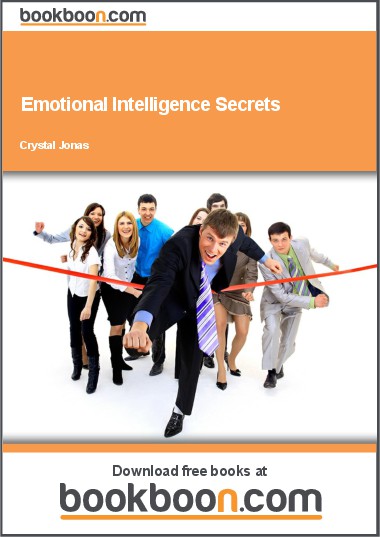Why Emotional Intelligence is the key to success – by Crystal Jonas


Interested in raising self-awareness and solving conflicts more easily? Then take a look at our latest interview of Bookboon author Crystal Jonas.
1. Crystal, your Bookboon eBook “Emotional Intelligence Secrets” is incredibly rich: it goes into great detail into the secrets behind human behaviors and the key to cooperating positively with others. Can you tell us more about how you became interested in this topic and why it is your main business today?
I’ve always been interested in what helps people be successful. Why, for example, are some people not very successful professionally, although they have a great work ethic? Why are some people well meaning, but they aren’t personally successful?
Many years ago, I first heard of Emotional Intelligence, and the idea that it’s the #1 predictor in personal and professional success, and that it could be worth as much as 85% of your success. My first response was, “Impossible! How could one concept be so important?” Upon looking closer, I found that Emotional Intelligence, or your EQ includes so many factors, from being self-aware and managing your emotions to being socially aware and managing your relationships. No wonder it’s so important! That covers just about every aspect of your personal and professional life! I knew that if I could learn more about EQ and make the ideas fun and easy for people to understand, I could, through my keynotes, seminars, books and audios, help others be who they are at their best and lead richer, more meaningful lives.
2. There is an expression that appears a few times in your eBook: “Where attention flows, energy goes”. Can you explain this expression?
You’re inundated with sensory data and if you didn’t have a system in your brain to filter all this information, you’d go mad! So, what you attend to comes clearly into focus. You can think of your attention as a filter, allowing the ideas that you want to see to come through. Your emotional and mental energy follows what you’re giving your thoughts to. If you’re thinking about becoming a more patient person, for example, your attention is on that. Your thoughts, actions and energy will naturally follow and notice and follow through on ideas that are in the forefront of your mind.
Bottom line, you’ll want to be mindful of what you allow to occupy mental real estate, as that is what you’ll be acting on!
3. You mention that one can learn the skill of “reading” emotional states of others. How does this work?
It’s so interesting to note how often people reveal what they are thinking if we just pay closer attention to them. Notice particularly what words people are using to describe their emotions. Echo their word choices back to them and ask them to tell you more. Also, particularly notice a sudden change in someone’s body language. Too often, people believe one gesture, such as arms over the chest means that the person is closed off. It could simply mean that that person is cold, comfortable in that stance, or dropped a bit of lunch on her blouse at lunch time. But, if you’re having a nice conversation, and suddenly she withdraws eye contact, crosses her legs and arms and starts to rub the back of her neck, check in quickly! Notice non-verbal nuances to become more socially aware of others and how they might think and feel about what’s going on around them.
4. “Emotional intelligence” sounds like mostly positive emotions. Chapter 4 argues that some emotions can seem good but are in fact bad. Can you give examples of “good” and “bad” emotions (apart from “joy and anger”)?
One might think that bliss is always good, for example. Whether it is always good for you personally depends on what you’re wanting to achieve.
Let’s take a specific goal and say that you’ve always wanted to write a book. You’ve heard that you need to spend some time each day contemplating your book as already written. Not only that, but it has made you wildly famous and wealthy beyond your imagination. Instead of actually writing your book, to make your vision a reality, you bliss out all day instead. Hence bliss, what you might think of as a “good” emotion has been tapped to your detriment and over-used, thus becoming what you could consider “bad” for you.
On the other hand, anger, which is a tremendous drain on your emotional energy could be used for good when appropriately applied. Imagine for a moment that I’ve asked you to visualize someone sitting off in the corner and this person is hopeless. Imagine how he looks, his body language and how he expresses himself. On a scale of 1 to 10, how high would you say his energy level is right now? Quite low, yes? If he is feeling hopeless because of something personal going on in his life right now, do you imagine he has the energy he needs to get up and change his situation? Now let’s say that he has told himself, “Enough, already! I’m tired of feeling sorry for myself, and I refuse to sit idly by any longer!” He could actually use anger to leverage the energy he needs to get up and act on his own behalf. In this scenario, anger, a “bad” emotion has spurred on a positive result, personal responsibility and action.
5. Towards the end of your eBook, you introduce the “multiplier”. He/she is a person who can have a positive influence over a group, and who can become a leader (“someone who demonstrates a positive example”). In a group, I can’t help but wonder whether this multiplier will be resented by their peers because they are taking over and trying to lead the way. How do you maintain a level of “cooperation” and not hierarchy?
A person can only be a multiplier if she or he is already good at recognizing the inherent value in each contributor at work and generous with praise and appreciation. If someone isn’t good at acknowledging the important role others play, she or he wouldn’t be able to elicit the best in others, and so would not be a multiplier. If one aspires to be a multiplier, then one would be wise to keep focused on the shared mission and to openly value and appreciate the work others do in making that happen.
Always give praise to others!
6. In your personal opinion, which emotion would you like to see more often at the workplace?
I love this question! I’d like to see more joy at work! In fact, right now, my most frequently requested keynote speech is called “Joy on the Job.” It’s important to note, though that joy isn’t an infinite source of pleasure that employees get to partake from. It’s finite and organic, and it only continues to thrive at work because people add their own joy to the mix. Briefly, here’s how to get more Joy on the Job:
The leadership must articulate with passion and clarity the mission and make it clear what each person does to contribute to that. Each employee sees that she or he is absolutely essential to carrying out this important mission. People therefore feel recognized, respected and valued. They understand that their work has meaning and they, as members of the team are personally and collectively a vital part of something lasting and meaningful. Joy on the job can be cultivated for anyone truly interested in learning how to do so.
Take a closer look at what emotional intelligence really is thanks to Crystal Jonas’s eBook Emotional Intelligence Secrets.




